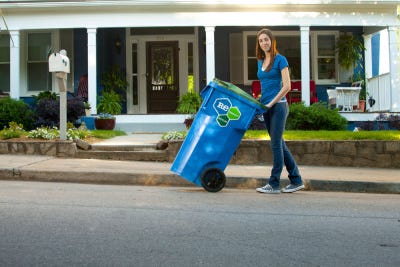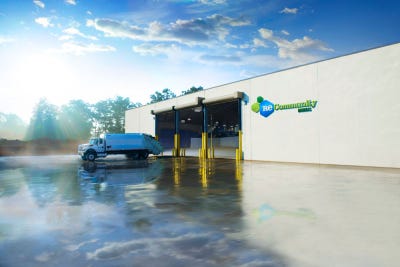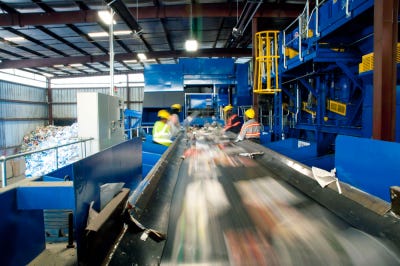ReCommunity Spirit
ReCommunity Recycling has prospered by carving out a unique niche in the recycling hierarchy.
ReCommunity Recycling characterizes itself as the largest pure play independent recycling company in the United States. New CEO James Devlin loves his company’s role so much he says it’s practically made in heaven.
“We want to eliminate (customer) expense, create revenue, create jobs in the community and hit their sustainability goals at the same time,” Devlin says. “I can’t think of anything that would be better on the side of the angels as we try to execute that type of plan. You can’t find an argument against it. I think it’s an outstanding set of goals to focus on.”
ReCommunity formed in 2011 in Charlotte, N.C., from Casella Waste Systems Inc.’s FCR operations. The company has since grown, in part by acquiring Newburgh, N.Y-based Hudson Baylor Corp.; Roseville, Mich.-based Great Lakes Recycling; and Blue Mountain Recycling in Philadelphia. ReCommunity now has 35 recycling facilities in 13 states, including 31 material recovery facilities (MRFs) and four transfer stations. It employs about 1,500. Though Devlin declines to give revenue figures for the privately held company, he characterizes ReCommunity as the third largest recycler in the United States (behind Houston-based Waste Management Inc. and Phoenix-based Republic Services Inc.) with about 5 to 6 percent of the market.
Devlin, with 27 years of recycling experience, most recently as president of Corapolis, Pa.-based Heckmann Corp.’s Heckmann Environmental Services division, joined ReCommunity in March to broaden the company’s reach. “We’re putting together a strategic plan now that runs to 2018, and we’ve identified the areas of growth that make sense for us, that make sense for our customers and our stakeholders as well.”
One of ReCommunity’s more immediate initiatives is to get a higher and better use for its existing commodities, which could reduce the cyclicality of pricing. “So we’re spending a lot of time going downstream, taking a look at what they’re producing, understanding what different processing and separation techniques weshould deploy,” Devlin says. The company has ample capacity at some of its MRFs, so filling that capacity is another priority.
He says he was attracted to the job because of the senior management team in place and its philosophy. “I love their approach to their customers, and their business model was very exciting to me, the public-private partnership.”
Partnership for Success
ReCommunity focuses on processing, marketing, building design and materials management, but it is not interested in collection, transfer or disposal. The company has a lot of partners, primarily in the public sector, that collect materials and supply them to ReCommunity. “They’re very good customers to us too, and that’s been a very nice fit, because our objectives are completely aligned with theirs,” Devlin says.
 Through the partnerships with municipalities, ReCommunity will design and build MRFs. In some cases another entity will operate it, and in some cases ReCommunity will just handle the materials marketing. “So I think the thing that’s really exciting about what we do, it conforms around what our customers need,” Devlin says. “It’s not a cookie cutter approach. We’re very flexible, very nimble, and that’s been one of the predicates of our growth, that type of mentality.”
Through the partnerships with municipalities, ReCommunity will design and build MRFs. In some cases another entity will operate it, and in some cases ReCommunity will just handle the materials marketing. “So I think the thing that’s really exciting about what we do, it conforms around what our customers need,” Devlin says. “It’s not a cookie cutter approach. We’re very flexible, very nimble, and that’s been one of the predicates of our growth, that type of mentality.”
While the bulk of ReCommunity’s volume comes from public-sector partnerships, the firm also wants to develop partnerships with some of the larger private collectors. Those types of arrangements benefit everyone, he says. “It’s a win if we can better utilize our MRFs, taking advantage of capital that’s already been deployed. We go back to sustainability: They don’t have to build an additional MRF that would be at 25-percent capacity if we’ve got a MRF at 75-percent capacity.”
One of those public-sector partnerships is with the Delaware Solid Waste Authority (DSWA), the Dover-based operation that manages all the state’s waste and recyclables. ReCommunity had been purchasing some of its material. When the state passed a universal recycling law the authority decided it needed a MRF, and ReCommunity put in the best bid, says Mike Parkowski, chief of business and governmental services for DSWA.
ReCommunity is building a more than 160,000-ton-per-year MRF that was to open at the end of June. ReCommunity will operate the facility, and the DWWA will share in some of the profits from the material processing under a 20-year agreement. The MRF will process most of the state’s recyclables.
Parkowski says ReCommunity was willing to make a big financial investment in the MRF. Eugene, Ore.-based Bulk Handling Systems supplied the equipment. Parkowski says the technology of the plant was top notch. “We realize in recycling to get the best prices you have to have the cleanest product,” he says. “The whole design they’ve put together really blew us out of the water compared to what others proposed.”
He says the DSWA also was impressed with ReCommunity’s willingness to work with a state entity. “It’s important that they understood the community aspect of it,” Parkowski says. “They’re bringing in local people, jobs, promoting the community aspect.”
ReCommunity seems to approach recycling with the right concept, Parkowski says; to develop markets rather than doing things fast. “In recycling, you’re only as good as your markets are.”
Market Development
Regarding markets, Devlin says ReCommunity is exploring partnerships with packaging and product makers, in terms of design for recycling, for example. The companies have been receptive to consider ReCommunity’s processing needs. “We’ve been spending a great deal of time and effort in R&D (research and development) to find higher and better use markets, especially with mixed plastics and glass.”
 ReCommunity has taken other steps to protect itself from commodity pricing volatility, including hedges such as fixed pricing. “Our approach is going to be if average commodity revenue is at a 10-year high or a 10-year low, we simply want to make a fair rate of return on the investments that we’re making,” Devlin says. “That enables us to continue to innovate, continue to improve the MRFs, continue to invest in the MRFs and the infrastructures that we’ve put in place.”
ReCommunity has taken other steps to protect itself from commodity pricing volatility, including hedges such as fixed pricing. “Our approach is going to be if average commodity revenue is at a 10-year high or a 10-year low, we simply want to make a fair rate of return on the investments that we’re making,” Devlin says. “That enables us to continue to innovate, continue to improve the MRFs, continue to invest in the MRFs and the infrastructures that we’ve put in place.”
One big area of investment for ReCommunity has been single-stream recycling. The company has completed 13 conversions of its existing facilities to single stream in the past five years. That’s indicative of both ReCommunity’s belief in single stream as well as that of its municipal partners, Devlin says. “It will continue to evolve and we’ll continue to be in front of it.”
ReCommunity has spent a great deal of effort on innovation, and has patented technologies. Devlin called the firm “technology agnostic – we’ll look at the best processing capabilities based upon what our customers need.”
“We’ve got great partnerships with all the major equipment manufacturers, and they’ve been great partners of ours,” he says. “We’ll make sure that we have the right processing technology to go deeper into these (waste) streams in the future.”
Most of what ReCommunity processes is residential, but it has the capability to process commercial waste at several of its facilities. It’s a different stream, high for example in old corrugated cardboard (OCC) and requiring a different processing approach. But if the company sees a particular opportunity for commercial processing, he says, it’ll make the investment.
A Teaching MRF
ReCommunity also works actively on the education side in communities, adds Stephen London, director of marketing for the company. The education section of the company’s website includes an interactive MRF and animated videos. “We have one responsibility of operating productively and safely in the communities,” he says. “But we also have another responsibility in advancing recycling in the community and promoting that.”
 Organics is the hot area of the waste stream in terms of collection and diversion. “Organics is something that maybe in the future we take a look at, but it’s not a primary business focus for us at least in the short term,” Devlin says.
Organics is the hot area of the waste stream in terms of collection and diversion. “Organics is something that maybe in the future we take a look at, but it’s not a primary business focus for us at least in the short term,” Devlin says.
He sees more diversion opportunities in the future of construction and demolition (C&D) debris. But regardless of the waste stream, he says, the company’s involvement needs to make sense. “I think at the end of the day, in order to be environmentally sustainable it’s got to be economically sustainable. I think it’s critically important and it’s always market driven. I think the industry has learned that over the last 20 to 30 years, that there’s a social demand, but we also as an industry have to find end-markets to make it economically viable for the customers to do the right thing.”
Devlin says mergers and acquisitions (M&A) will continue to be a way for the company to grow. ReCommunity will be looking for companies with intriguing customer relationships but that are perhaps undercapitalized; situations where ReCommunity can infuse some investment. “Also, we can think about customers or targets that have really unique and value-created off-take agreements.”
Devlin sees ReCommunity growing through M&A combined with additional streams. “We’re looking hard at materials-handling type opportunities for some of our customers that don’t see this as a core business; they see it as a distraction to their core business. They’re committed to sustainability, but they want somebody else to take care of it for them. And we see that as a very unique opportunity.”
Having the financial backing to make these things happen is critical for ReCommunity. The company has five financial partners, led by Pegasus Capital Advisors (New York), Intersection Partners (Westport, Conn.) and MissionPoint Capital Partners (Norwalk, Conn.). HarbourVest Partners (Boston) and Ares Capital Corp. (New York) are financial backers as well. “They’re patient, they’re well-capitalized and they understand the industry very well,” Devlin says. “They know that in order for us to be successful we have to create value for our customers. They’re willing to make these investments in the business and they’re excited about the green space.”
ReCommunity’s goal isn’t to be the biggest recycler in the industry, Devlin says, but rather to be the best at what it does and create value for its partners and investors.
“We’re very excited with where we sit,” Devlin says. “We’re very bullish about the future of the recycling community and our markets.”
Allan Gerlat is News Editor for Waste360.
About the Author
You May Also Like


